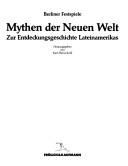| Listing 1 - 10 of 10 |
Sort by
|
Book
Abstract | Keywords | Export | Availability | Bookmark
 Loading...
Loading...Choose an application
- Reference Manager
- EndNote
- RefWorks (Direct export to RefWorks)
Book
ISBN: 9783406468353 Year: 2012 Publisher: München Beck
Abstract | Keywords | Export | Availability | Bookmark
 Loading...
Loading...Choose an application
- Reference Manager
- EndNote
- RefWorks (Direct export to RefWorks)
Book
ISBN: 9781912385249 1912385244 Year: 2020 Publisher: [Canon Pyon] : Sean Kingston Publishing,
Abstract | Keywords | Export | Availability | Bookmark
 Loading...
Loading...Choose an application
- Reference Manager
- EndNote
- RefWorks (Direct export to RefWorks)
We both give meanings to, and derive our own meanings from, the multitude of objects we live amongst. Trivial things remind us of past loves; old things embody an idealized past; on other things we believe our fate depends. In this book, Karl-Heinz Kohl describes relationships to sacred objects from the viewpoint of anthropology and the history of religion, showing how people of all cultures ascribe quite immeasurable value to things and make their own destiny dependent on these objects.During their voyages of discovery, Portuguese seafarers came across Africans who attributed mysterious powers to objects that became known as 'fetishes', and the concept of 'fetishism' soon cast a spell over European thinkers. The Church condemned it as the work of the devil, while for the philosophers of the Enlightenment it proved that no religion was rational at heart. But the fascination remained - Hegel, Comte, Marx and Freud - each of them tried to solve the riddle of fetishism in their own way. And it is fetishism that is the starting point for this book, which offers nothing less than a comprehensive theory of the sacred object,from the stone cult of ancient Israel and the Bible's prohibition on images, to the medieval cult of reliquaries, Native American sacred bundles, magical figures of the BaKongo, and the idols of the Ancient Greeks. Tracing the fate of ancient cult images since their rediscovery in the Renaissance, Kohl comes to a striking conclusion: in the secularized societies of the Global North, it is the museum cult that is the bastion of contemporary fetishism.'

ISBN: 3887251202 Year: 1982 Publisher: Place of publication unknown Frölich & Kaufmann
Abstract | Keywords | Export | Availability | Bookmark
 Loading...
Loading...Choose an application
- Reference Manager
- EndNote
- RefWorks (Direct export to RefWorks)
Book
ISBN: 388479440X Year: 1989 Publisher: Würzburg Königshausen und Neumann
Abstract | Keywords | Export | Availability | Bookmark
 Loading...
Loading...Choose an application
- Reference Manager
- EndNote
- RefWorks (Direct export to RefWorks)
Periodical
ISSN: 01703544 Publisher: Wiesbaden.
Abstract | Keywords | Export | Availability | Bookmark
 Loading...
Loading...Choose an application
- Reference Manager
- EndNote
- RefWorks (Direct export to RefWorks)
Book
ISBN: 9783945340073 Year: 2019 Publisher: Frankfurt am Main Kula Verlag
Abstract | Keywords | Export | Availability | Bookmark
 Loading...
Loading...Choose an application
- Reference Manager
- EndNote
- RefWorks (Direct export to RefWorks)
Museology --- Ethnology. Cultural anthropology --- ethnology --- museums [institutions] --- Humboldt Forum in the Berlin Palace
Book

ISBN: 3846751928 Year: 2020 Publisher: Paderborn Brill | Fink
Abstract | Keywords | Export | Availability | Bookmark
 Loading...
Loading...Choose an application
- Reference Manager
- EndNote
- RefWorks (Direct export to RefWorks)
Westliche Gesellschaften geben sich heute in weiten Bereichen betont als tabufrei. Doch die gleichen Gesellschaften sind durchzogen von impliziten Verhaltensmaßgaben, die unser Fühlen, Denken und Handeln reglementieren und vorgeben, was tolerierbar ist und was als sittenwidrig und bedrohlich wahrgenommen wird. Was heute noch tabuartig wirksam ist, liegt nicht offen zutage. Es verbirgt sich in den kultur- und mentalitätengeschichtlichen Latenzzonen einer Gesellschaft. Besondere Ereignisse können diese kollektiv unbewussten Wertsetzungen jedoch sichtbar werden lassen. Der Band exploriert die Latenz und Aktualität solch tabuartiger Normen, sondiert aktuelle gesellschaftliche Meidezonen und untersucht, inwiefern sich an Ihnen ein Wandel der historischen Dialektik von Tabu und Tabubruch messen lässt.
Kulturgeschichte --- Mentalitätsgeschichte --- Gesellschaft --- Gegenwart --- Dialektik
Book

ISBN: 9780824840440 Year: 2004 Publisher: Honolulu
Abstract | Keywords | Export | Availability | Bookmark
 Loading...
Loading...Choose an application
- Reference Manager
- EndNote
- RefWorks (Direct export to RefWorks)
Book

Year: 1982 Publisher: Frölich & Kaufmann
Abstract | Keywords | Export | Availability | Bookmark
 Loading...
Loading...Choose an application
- Reference Manager
- EndNote
- RefWorks (Direct export to RefWorks)
Art --- anthropology --- ontdekking van Amerika --- Latin America
| Listing 1 - 10 of 10 |
Sort by
|

 Search
Search Feedback
Feedback About UniCat
About UniCat  Help
Help News
News